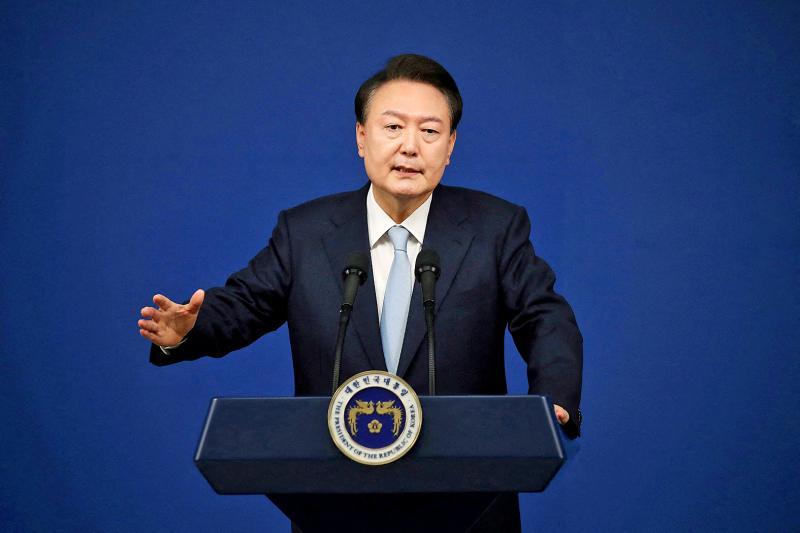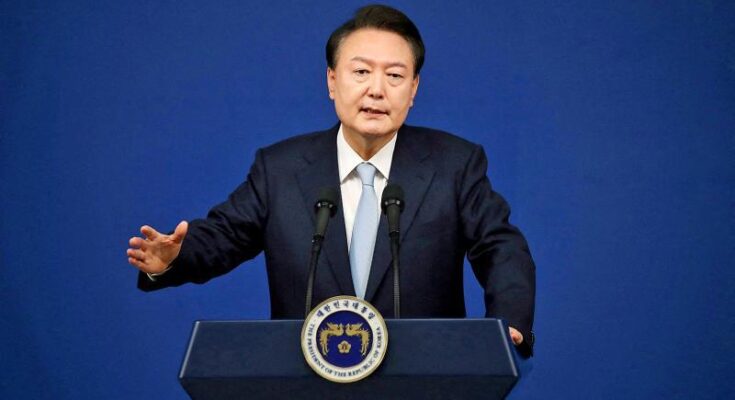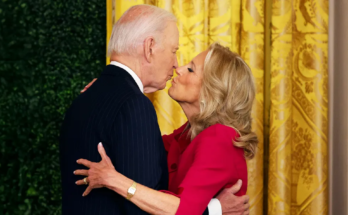Reuters, SEOUL
South Korea’s parliament introduced a motion today to impeach President Yoon Suk Yeol over a botched attempt to impose martial law, while the defense minister blamed for advising the move and ordering troops to the parliament building resigned.
Lawmakers from the opposition Democratic Party plan to put up a vote in parliament to impeach Yoon at around 7pm on Saturday, a party spokesperson told reporters.
Yoon’s ruling People Power Party is divided over the crisis but said it would oppose impeachment with two years left in Yoon’s five-year term.

South Korean President Yoon Suk Yeol delivers a speech at a press conference at the presidential office in Seoul on Aug. 29.
Photo: Reuters
“The Yoon Suk Yeol regime’s declaration of emergency martial law caused great confusion and fear among our people,” Democratic Party lawmaker Kim Seung-won told a session of South Korea’s National Assembly held earlier today.
The Democratic Party needs at least eight of the ruling party’s 108 lawmakers to back the impeachment bill for it to pass with a two-thirds majority of the 300-seat parliament.
Fighting for his political future, Yoon accepted the resignation of Defense Minister Kim Yong-hyun today and nominated his ambassador to Saudi Arabia, Choi Byung-hyuk, as a replacement, Yoon’s office said.
Kim had recommended Yoon declare martial law late on Tuesday, according to a senior military official and the filing to impeach Yoon by opposition members. Kim also ordered the deployment of troops to the parliament, Vice-Defense Minister Kim Seon-ho said, adding he was unaware of the martial law order until Yoon declared it.
“I have fundamentally opposed the mobilization of military forces under martial law and have expressed negative opinions about it,” he told a parliament hearing today, apologizing and taking responsibility for failing to prevent it.
The declaration of martial law attempted to ban political activity and censor the media in Asia’s fourth-largest economy and a key US ally. It sparked outrage in the streets and concern among its international allies.
Japanese Prime Minister Shigeru Ishiba said Japan’s “security situation may be fundamentally changed” in light of the instability in Seoul and North Korea’s rising military assertiveness.
“What will happen to South Korea? There appears to be a great deal of domestic criticism and opposition,” he told parliament today, adding that Yoon’s efforts to improve relations with Tokyo “must never be undermined.”
There has been no reaction yet from North Korea to the drama in the South.
US Secretary of State Antony Blinken told Reuters yesterday the US had not been made aware in advance of Yoon’s declaration, while his deputy, Kurt Campbell, said Yoon had badly misjudged it.
Yoon had been embraced by leaders in the West as a partner in the US-led effort to unify democracies against growing authoritarianism in China, Russia and elsewhere.
However, he caused unease among South Koreans by branding his critics as “communist totalitarian and anti-state forces.” Last month, he denied wrongdoing in response to influence-peddling allegations against him and his wife and he has taken a hard line against labor unions.
NIGHT OF CHAOS
The impeachment follows a night of chaos after Yoon declared martial law and armed troops attempted to force their way into the National Assembly building in Seoul, only to stand back when parliamentary aides sprayed them with fire extinguishers.
The commander of the martial law troops said he had no intention of wielding firearms against the public, and Kim, the vice defense minister, said no live ammunition had been provided to those troops.
“The people and the aides who protected parliament protected us with their bodies. The people won, and it’s now time for us to protect the people,” the Democratic Party’s Kim said.
“We need to immediately suspend the authority of President Yoon. He has committed an indelible, historic crime against the people, whose anxiety needs to be soothed so that they can return to their daily lives.”
The martial law crisis rattled global financial markets and South Korea’s benchmark KOSPI index. Currency dealers reported suspected state intervention yesterday to keep the won stable.
Finance Minister Choi Sang-mok sent an emergency note to global financial chiefs and credit rating agencies late yesterday to say the ministry was working to alleviate any adverse impact from political turmoil.
If the impeachment bill passes, South Korea’s Constitutional Court will then decide whether to uphold the motion – a process that could take up to 180 days.
If Yoon were to be suspended from exercising power, Prime Minister Han Duck-soo would fill in as leader.
If the embattled president resigns or is removed from office, a new election would be held within 60 days.
Yoon, a career prosecutor, squeezed out a victory in the tightest presidential election in South Korean history in 2022, riding a wave of discontent over economic policy, scandals and gender wars.
However, his support ratings have been at around 20% for months and the opposition captured nearly two-thirds of seats in parliament in elections this April.



